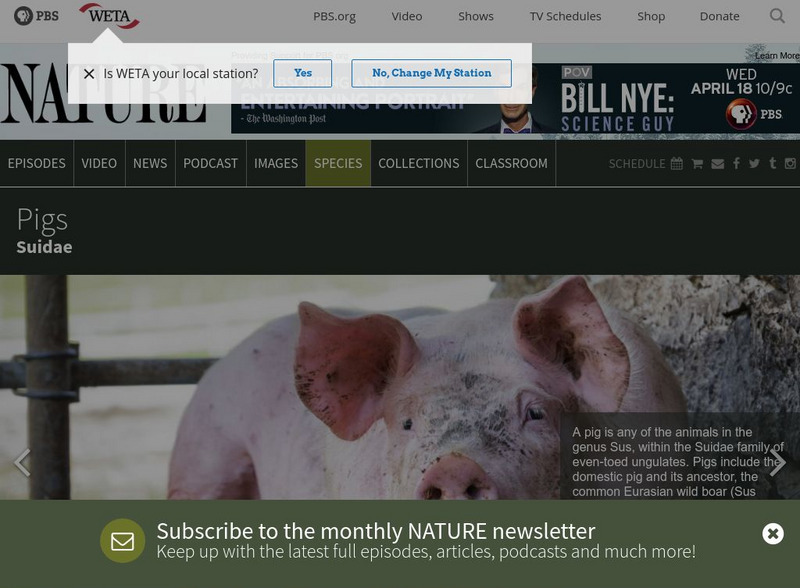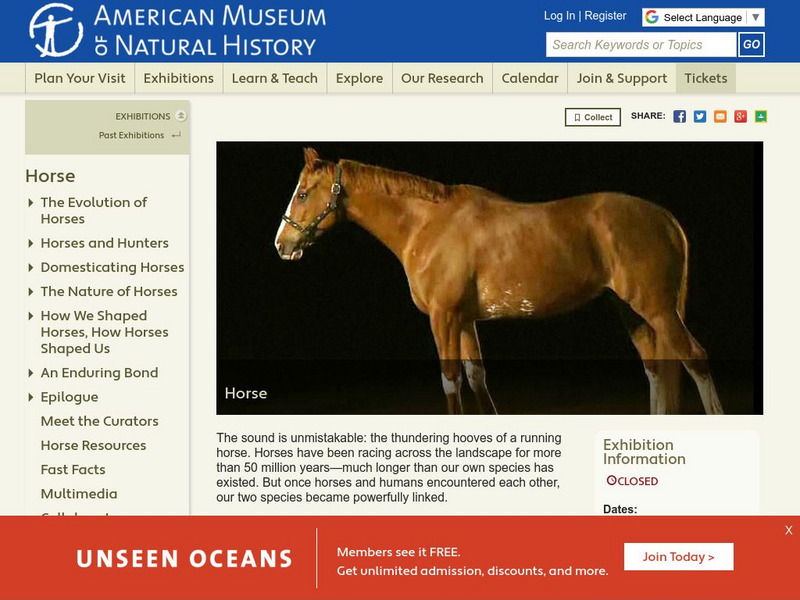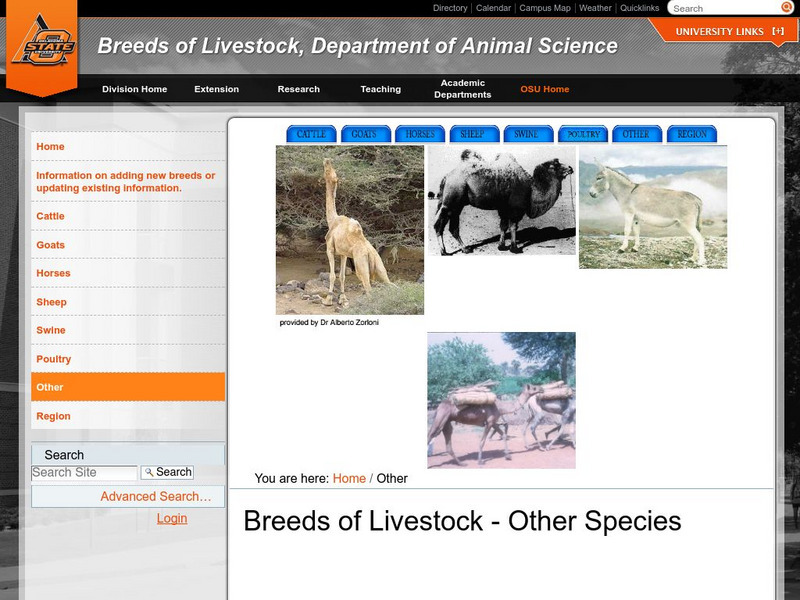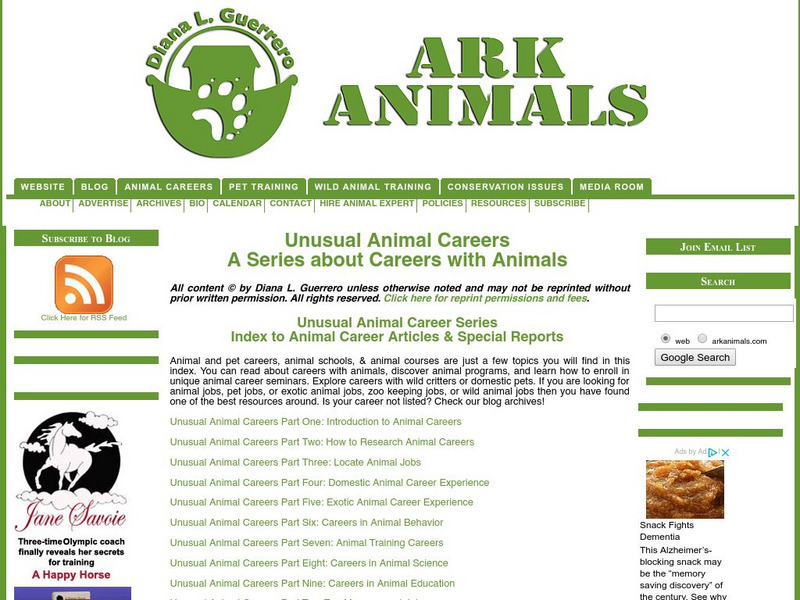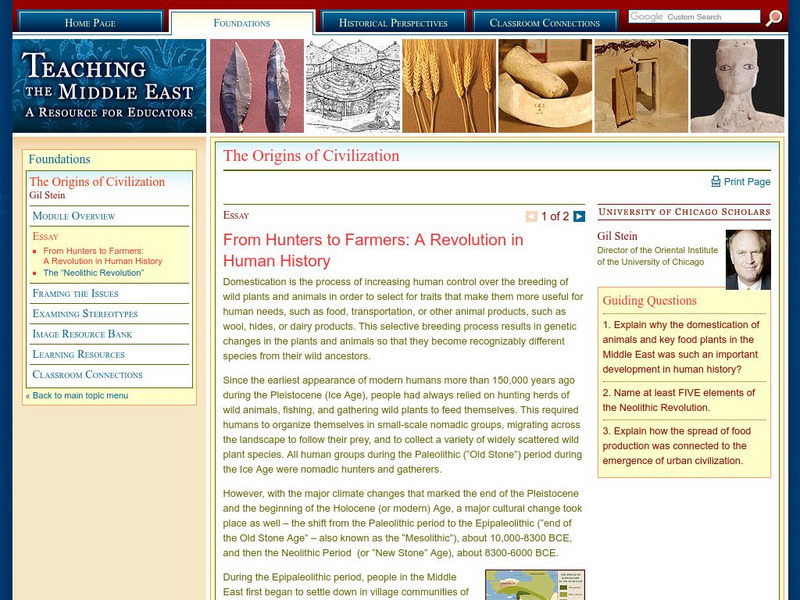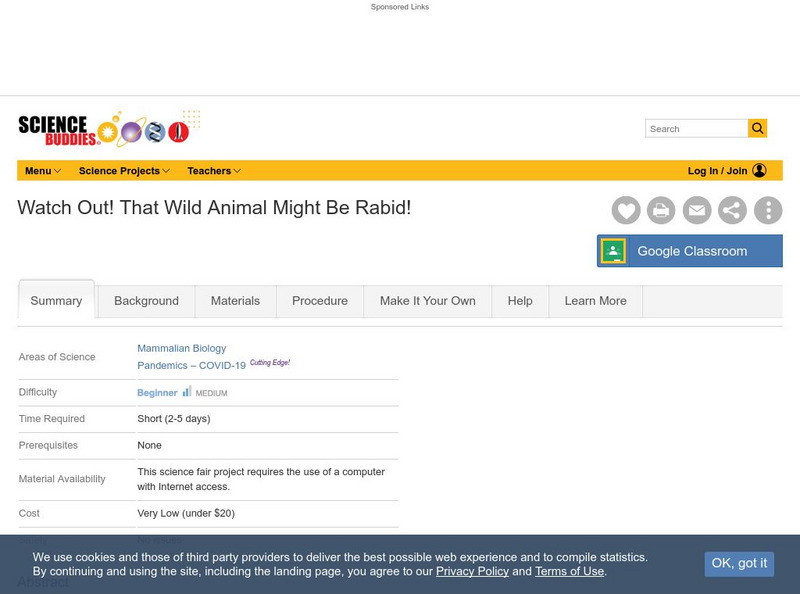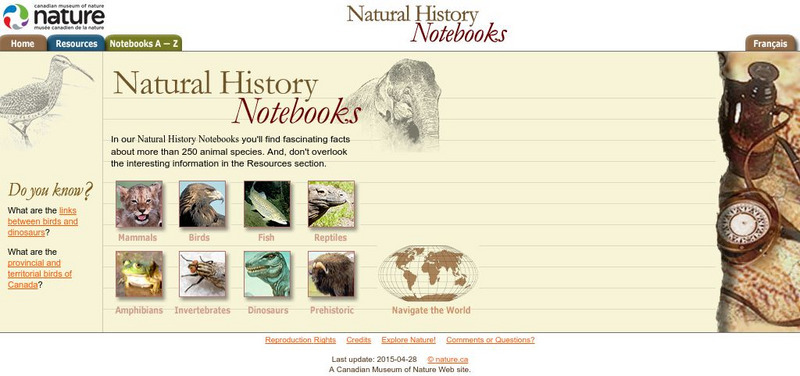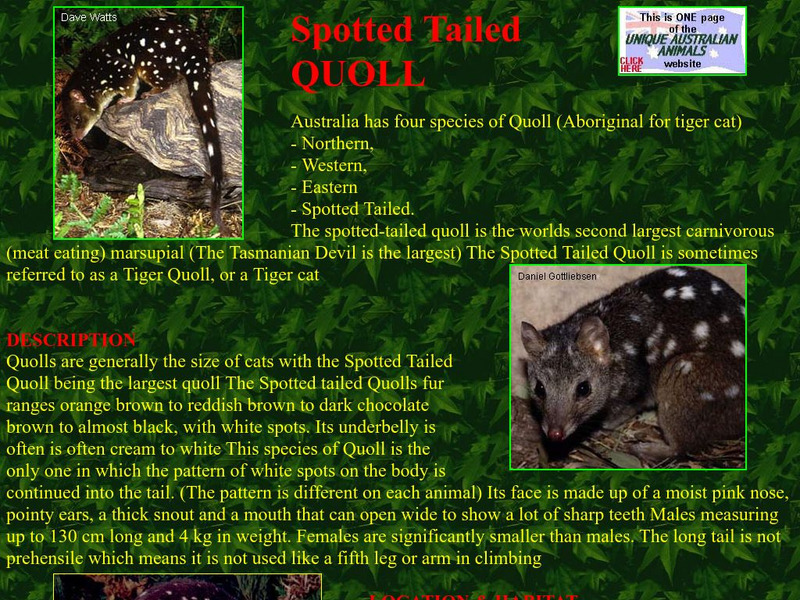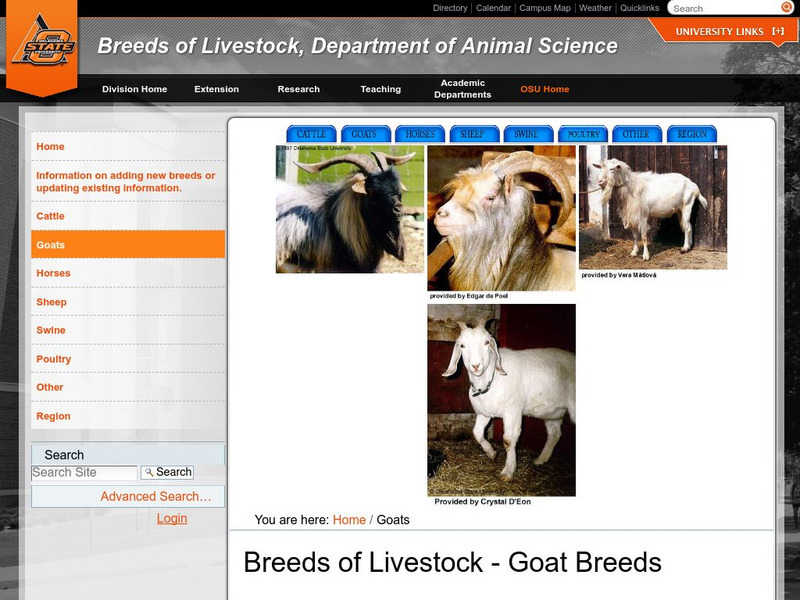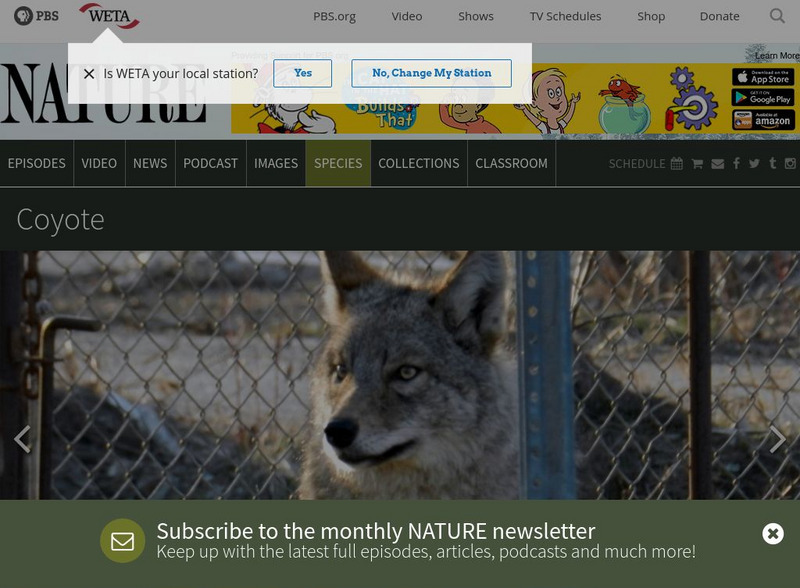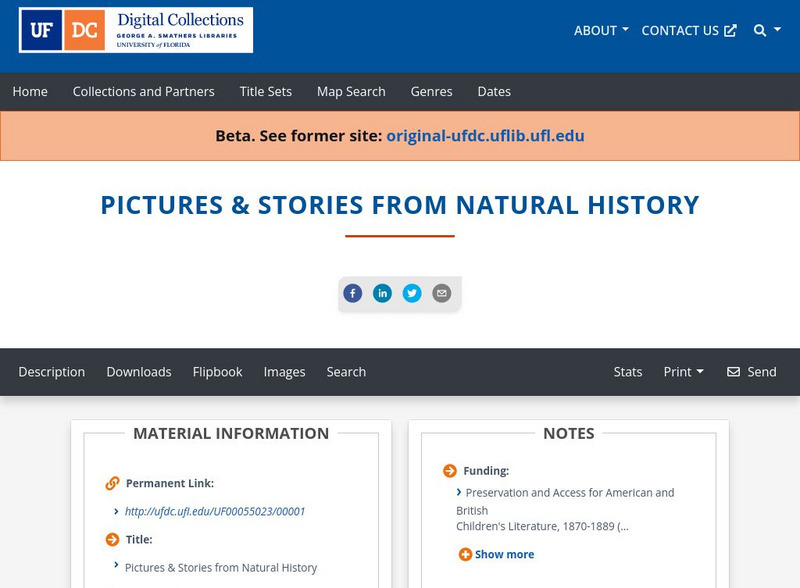Hi, what do you want to do?
Ducksters
Ducksters: Animals for Kids: Maine Coon Cat
Kids learn about the Maine Coon Cat, largest domesticated breed with good temperament. Does it make a good pet?
PBS
Pbs Nature: Pigs
This resource offers a clear and concise description of domesticated pigs. Students who need help narrowing their informational search will benefit from this type of condensed resource.
American Museum of Natural History
American Museum of Natural History: The Horse
This resource presents illustrated essays about horses, developed in conjunction with museum-mounted exhibition, cover a wide range of topics, including the evolution of horses, the domestication of horses, the nature of horses, and the...
Oklahoma State University
Oklahoma State Univ: Breeds of Livestock Other Species
This is a good overview of the use of "other species" that one would not immediately think of as a domesticated mammal. Examples include Buffalo and Llamas.
A-Z Animals
A Z Animals: Animal Facts: Bombay
Provides an overview of the Bombay cat, including their appearance, temperament, and value as a pet.
World History Encyclopedia
World History Encyclopedia: Animal Husbandry
Reference page takes a look at the history of animal husbandry which deals with the domestication of, care for, and breeding of animals.
A-Z Animals
A Z Animals: Animal Facts: Abyssinian
Provides images and a summary of the Abyssinian Cat while offering statistics and details on the breed's temperament and value as a pet.
A-Z Animals
A Z Animals: Animal Facts: Javanese
Provides an overview of the Javanese cat, including their appearance, temperament, and value as a pet.
Other
Ark Animal Tracks: Careers With Animals
Vocational article about working as an animal trainer for both wild and domestic animals.
University of Chicago
University of Chicago: Teach Middle East: Hunters to Farmers
An essay reviewing the history of the Neolithic Revolution where humans begin as nomadic hunters and gatherers and evolve into villages with domestic agriculture and animals.
Science Buddies
Science Buddies: Watch Out! That Wild Animal Might Be Rabid!
The word rabid often makes people think of an animal that is extremely violent, crazy, and maybe even foaming at the mouth. But not all animals infected with the rabies disease fit that description. Nevertheless, it is important to avoid...
Other
International Guide Dog Federation: History of Guide Dogs
This page from the International Guide Dog Federation explores the evolution of dogs as human companions, as well as the history of dogs as service animals. This resource also includes a timeline describing how dogs came to be used as...
Canadian Museum of Nature
Canadian Museum of Nature: Natural History Notebooks
This site from the Canadian Museum of Nature, a natural history museum, provides short information blurbs and fun facts on over 240 different common animals categorized by type (mammals, fish, reptiles, invertebrates, amphibians,...
Curated OER
Eternal Egypt: Model of Domestic Animals
The wooden model of domestic animals features a cow, two calves, and three donkeys. Through magic, the domestic animals will come to life to provide for the deceased in the afterlife.
Unique Australian Animals
Unique Australian Animals: Spotted Tailed Quoll
The world's second largest carnivorous marsupial, the spotted tailed quoll, is no bigger than a domestic cat and found only in Australia.
Oklahoma State University
Oklahoma State University: Breeds of Livestock Goats
A good history of our use of goats and links to the major breeds of domesticated goats and their specific uses.
Andre Dollinger
Reshafim: Meat and Fish
An interesting look at the role meat and fish played in the Egyptians' diet. Many kinds of animals were domesticated for use of both upper and lower classes. Hyperlinks for more information.
Countries and Their Cultures
Countries and Their Cultures: Dogon
The Dogon are a group of about 250,000 people who live primarily in the districts of Bandiagara and Douentza in the western African nation of Mali. They are primarily agriculturists, their principal crops being millet, sorghum, rice,...
PBS
Pbs Nature: Coyote
What do you know about coyotes? Learn more about how adaptable this animal is to new surroundings when you check out this informative resource. Explore this website to find more facts and information ranging from what these animals eat...
Countries and Their Cultures
Countries and Their Cultures: Anuak
The Anuak live in a region straddling the border of the southern Sudan and Ethiopia. The Anuak language is most closely related to Shilluk. Together, the two languages comprise a subfamily within the larger classification of Nilotic....
TED Talks
Ted: Ted Ed: Why Do Dogs Have Floppy Ears?
Have you ever wondered why some dogs have floppy ears, but wolves don't? This video by NPR's Skunk Bear illustrates the evolutionary process that may explain why certain domesticated animals look and act differently than their untamed...
University of Florida
Baldwin Library: Pictures & Stories From Natural History by Mc Loughlin Bros.
This is an online photocopy of the original text of the children's book Pictures & Stories from Natural History by McLoughlin Bros. (1886), a nonfiction, illustrated book about all types of animals including domestic, farm, wild, and...
Other
Todo Perros
A good place for Spanish speakers to find everything related to dogs. Topics run the gamut: dog sports, dog cemeteries, breeders, pictures, veterinary medicine, dog care, and dog products, ads, and shops.
Enchanted Learning
Enchanted Learning: Cow
Here you'll find some fun and good information about cattle. Learn about this animal's anatomy, diet, and use on farms. A great diagram is also included.
Other popular searches
- Domesticated Animals
- Dogs as Domesticated Animals
- Animals Domesticated 4h
- Showing Animals Domesticated






